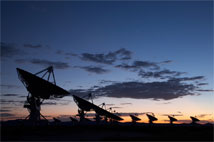
VLA-EVLA
The EVLA will have a continuum sensitivity 10 times the VLA, frequency coverage between 1 and 50 GHz that can be observed with an instantaneous bandwidth of up to 8 GHz, and at least 16 000 channels in each polarization. This vast increase in observing power brings unprecedented scientific capability to centimeter wavelengths that emplaces the EVLA as a world-leading radio telescope in the next decade.
With limited shared-risk observing starting in approximately late 2009, and full operational capability in 2012, the NRAO is sponsoring and hosting the first of a series of workshops to bring together astronomers from across the electromagnetic spectrum to start exploring the wide-range of science questions where the EVLA will be a pivotal instrument.
The first workshop of this series will focus on galaxy evolution through cosmic time. Recent years have seen a wealth of data on galaxy properties from low to very high (z > 7) redshift, greatly improving our insights on galaxy evolution, but raising many new questions. In particular, the large surveys (both wide and ultra deep) have contributed to a better understanding of the global picture. One of the great strengths of the EVLA will be its survey capability, both in continuum and spectral line.
Topics to be discussed include: (1) gas and galaxy evolution, (2) the evolution of structural properties of galaxies, and (3) cosmological surveys, wide and ultra deep. Included will be a general deliberation regarding surveys using the EVLA.
The workshop will highlight the new capabilities of the EVLA and the anticipated timeline of the availability of increasing capability. A number of talks will discuss challenging projects that highlight the capability and flexibility of the instrument.
Most workshop presentations will be contributed talks of 15 to 25 minutes, and we encourage speakers to consider how the EVLA might contribute to their field. There will be a number of break-out sessions for smaller group discussion of projects that could be carried out as shared-risk early science project and that would advance the science areas discussed in the plenary sessions.
The 3-day workshop will be held in Socorro, NM on December 16 - 18, 2008 (Tuesday - Thursday). Registration will open on September 22, 2008 at http://www.aoc.nrao.edu/events/galform. There will be no proceedings, but contributions (PowerPoint or PDF) will be posted and archived on the web.